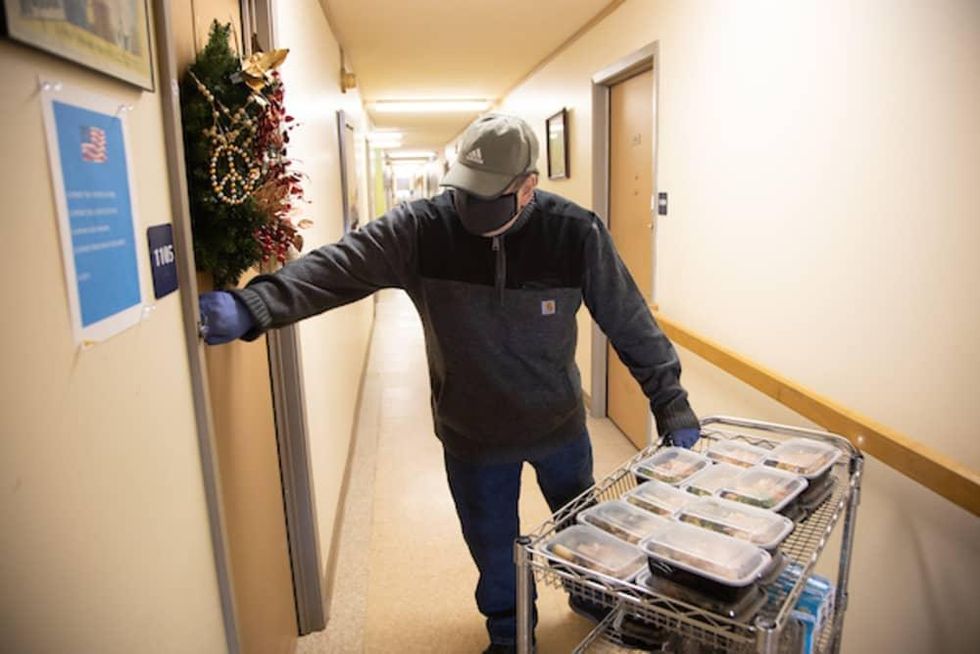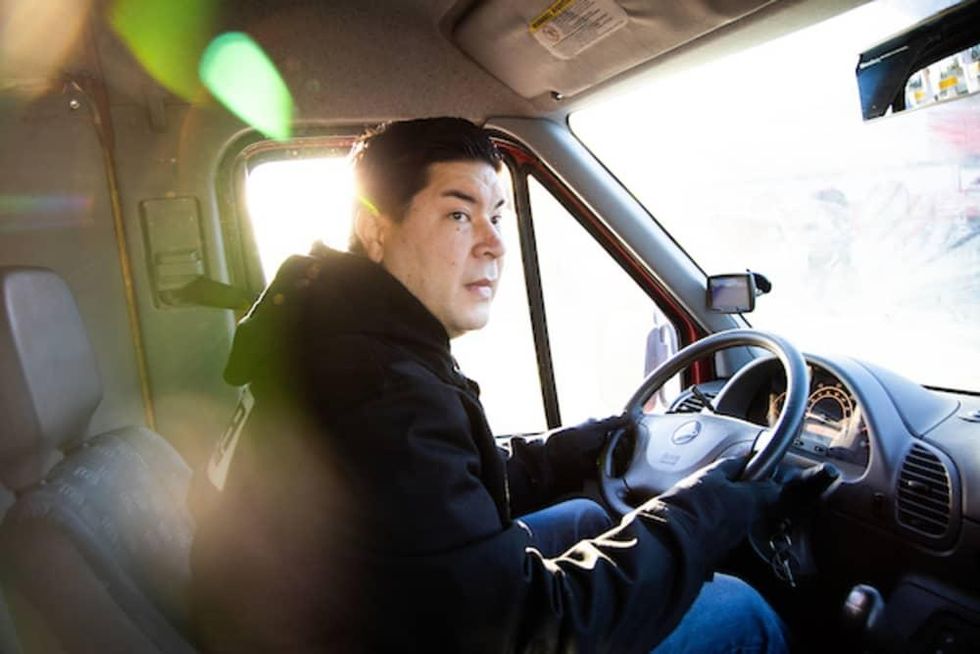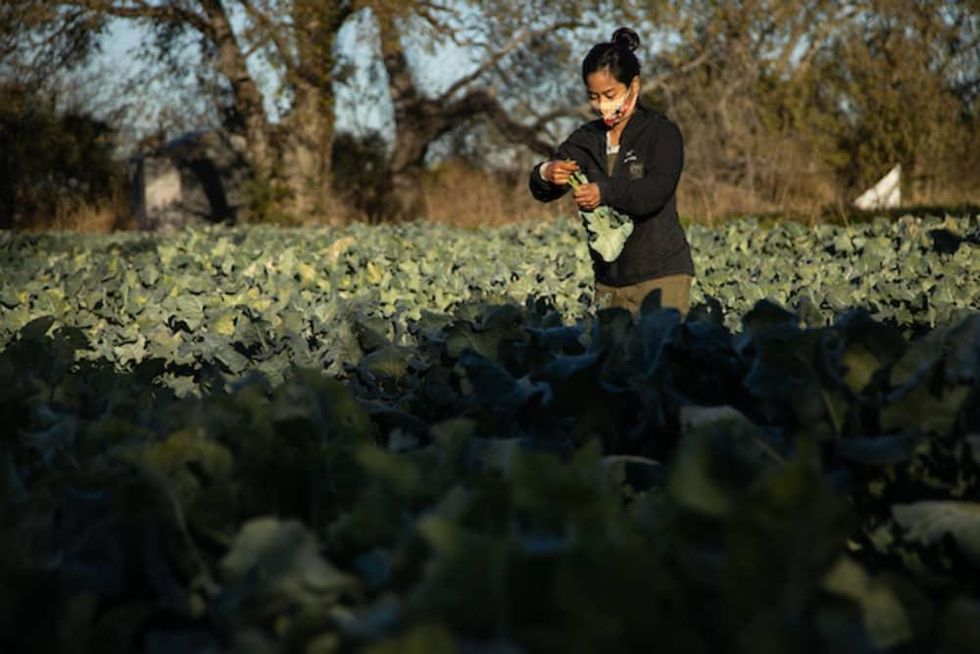Knitting the safety net
Austin restaurants battle to survive pandemic through good work
On March 17, 2020, the City of Austin issued unprecedented restrictions on bars and restaurants in an effort to curb the spread of COVID-19. The new rules effectively shut down the city's second largest industry, pushing thousands onto unemployment and sending small business owners scrambling.
It set off a series of extraordinary repercussions with which our city is still grappling: commercial kitchens across the city closed and local farms and purveyors who count on restaurants for most of their business were left with an abundance of goods and nowhere to sell them.
As the local hospitality community imploded, the pandemic also exposed how Austin's most vulnerable populations — children, senior citizens, the homebound, and the undocumented — rely on a thinly-tethered safety net ripped apart by the past year.
Over the past 10 months, the Austin restaurant community and these populations have been knitted together, often unknowingly, by hospitality leaders, local nonprofits, and city officials. At the forefront is Good Work Austin, a homegrown organization that has organized to keep local restaurants running and ensure that residents of Austin, Texas, one of the nation's boomtowns, have enough to eat.
Hungry and stuck at home
At L'Oca d'Oro, one of the city's prized Italian restaurants, co-owner Adam Orman and chef Fiore Tedesco found themselves at a crossroads last spring. Their Mueller dining room and kitchen were both empty for the foreseeable future, but their suppliers, which included local farms and purveyors, were still stocked.
The pair mentioned it during their weekly Zoom call with Good Work Austin, the 3-year-old nonprofit founded by the L'Oca crew along with like-minded small businesses and members of Austin's hospitality scene. The group, eventually known as Good Work, formed in 2017 to advocate for the city's first paid sick leave ordinance and has continued working with the city on workers' rights, wage minimums, and other restaurant-related issues.
During their meeting, the group discussed the conundrum — empty kitchens, hungry Austinites — and decided to take action. They tapped United Way for Greater Austin to help access funding, and using a mixture of private donations and grants secured by United Way, Good Work Austin was able to launch Safe Table, a project putting two local restaurants to work preparing 700 meals a week for elderly Austinites who face systemic barriers to accessing food.
To launch Safe Table, Good Work Austin partnered with Serafina, a food pantry run out of the ground-floor level of the Rebekah Baines Johnson Tower, in East Austin. The RBJ Tower is home to hundreds of low-income seniors, many of whom were homebound by the threat of COVID-19. As the pandemic wore on, Serafina was left crippled by a lack of volunteers due to the stay-at-home order, a lack of donations, and an uptick in people needing their services. When things got really low, Serafina's founder, Farah Rivera, would take to her local NextDoor asking neighbors for donations to the pantry.
Of the two restaurants tapped to take on the Safe Table initiative was Reunion 19, a taqueria that opened in February 2020, just a few blocks away from the RBJ Tower. Early last spring, as the grip of the pandemic was tightening, chef and co-owner Christopher Haydostian was connected with Good Work Austin, a move he says helped salvage his fledgling business.
“You’re what’s saving my business, is what I told Adam,” says Haydostian, who also works on another Good Work Austin project feeding Austin's homeless populations. “We survived 30 days as an actual operating restaurant. We reopened [last spring] with nothing and … our staff of almost 30 shrunk to four.”
With the funding, Haydostian was able to add a few more hires to his skeleton crew, and now works six days a week to make, package, and deliver meals to Safe Table, where their meals are then delivered directly to the apartment doors of RBJ residents.
“Right now it’s awesome, I have purpose, so that’s a whole new level of love and passion for what we’re doing,” Haydostian says.
But the restaurateur is also aware of how precarious his situation has become and just how much it will take to keep his dream alive.
"I’ve been a chef for 17 years and I've always dreamt of having my own restaurant, and I'll sacrifice anything to make my dreams come true," says Haydostian. "I’ve applied to every single credit card I can get. That’s how I keep the restaurant going."
Out of school and out of options
For thousands of Austin school children who rely on in-school breakfast and lunch, the COVID-19 stay-home orders threw them back into food insecurity. As a way to keep kids fed, Austin ISD Food Service expanded their scope to provide breakfast and lunch to children and their caregivers throughout the pandemic, a massive undertaking that required the City of Austin to approve food access contracts.
Seeing an opportunity to help get those kids fed while also helping restaurants generate income and pay staff, AISD made the contracts available to local businesses and Good Work Austin applied and won the gig, beating out big food services companies.
"We were in a really good place when the pandemic started, [because we] have a foundation and have our values in place, and have like-minded businesses in contact with each other," Orman explains. "What we started to do was talk to City Council about contracts for feeding folks in Austin."
By mid-summer, the nonprofit had secured contracts with both the Austin Independent School District and Austin Public Health, supplying daily meals for school children out of local kitchens like L'Oca d'Oro, Colleen’s Kitchen, Contigo, Rosedale Kitchen, Chez Zee, and Swift’s Attic. Within weeks, the restaurants were producing 25,000 meals a week for about $5 a meal.
“Finding something predictable, finding something consistent, even if you’re being paid five dollars a meal, is a win,” says Orman.
A transition this big was not without its challenges. In the early days, chef Tedesco even struggled to find a pot in the L'Oca kitchen big enough to produce the amount of sauce needed for one meal.
"The first couple of weeks were just such a disaster," Orman laughs, "figuring out the right packaging so the food looks good, so the food isn’t leaking, so it’s not taking up too much space, and to still do it in compostable packaging and paying everyone well."
Ensuring everyone EATs well
On October 15, Austin City Council approved a nine-week agreement with Good Work Austin to provide meals for persons experiencing homelessness, dubbed Eating Apart Together, or the clever acronym EAT.
Along with feeding hungry Austinites, the Eating Apart Together initiative has also helped pump cash into local restaurants like Reunion 19, which creates meals for three area food banks in addition to its work with Safe Table.
Over the past few months, EAT's success has secured a temporary contract extension through February. And after that? No one knows, but Orman says he hopes the city sees the value in keeping these contracts with local businesses.
"We've got this one contract that is helping a couple of restaurants [stay] afloat," he says. "Let’s make sure we keep adding more contracts and more restaurants so we can start to make ourselves indispensable, so the city is counting on us to make these meals and keep people employed."
---
This story was produced in partnership with Resolve Magazine. For a full gallery of images, head here.



